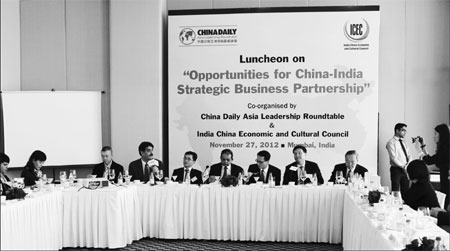
However, barriers like unfavorable policy, mistrust need to be removed
If China and India can remove some hurdles and work together more closely, they will be able to change the whole world, participants told the "Opportunities for China-Indian Strategic Business Partnership" forum in Mumbai on Tuesday.
Though China is India's largest trade partner, there is not much collaboration in other fields. Meanwhile, business relations are often obstructed with unfavorable government policies and misconceptions.
|
 Participants discuss issues on China-India business relations at the "Opportunities for China-India Strategic Business Partnership" forum in Mumbai, India on Tuesday. [Photo/China Daily] |
"As Asia is hailed as the savior of the world economy, China and India are emerging as the first-tier world economic giants. However, the bilateral trade volume and business activities between the two pale in comparison with their respective weight in world economy," said Zhou Li, publisher and editor-in-chief of China Daily Asia Pacific.
The luncheon panel discussion was co-hosted by China Daily Asia Leadership Roundtable, an invitation only network of Asian decision makers, and the India-China Economic and Cultural Council, or ICEC, an Indian non-governmental organization.
Representatives from leading Chinese companies in India, like the Industrial and Commercial Bank of China (Mumbai branch), ZTE Telecom India and power giant TBEA Energy India, laid on the table the opportunities they foresee, the challenges they face and suggestions as to what can be done to create better synergy between Chinese and Indian companies.
Cui Liangjun, CEO of ZTE Telecom India, said the company, which arrived in India in 1999, has almost all India telecom operators as its customers. While there is huge potential in India, especially in the rural areas where mobile phone penetration is less than 20 percent in some places, there are also hurdles like visa difficulties and security issues. However, ZTE remains optimistic and will be seeking to expand its operations in the next few years from the telecom sector to power, education and railways.
TBEA General Manager Liu Wei mentioned taxation problems the company faced initially. Now with its factory being built in western Gujarat state, there are problems with labor and subcontractors, he said.
"Despite the challenges, if China and India work together they will change the world," said Zheng Xinli, permanent vice-chairman, China Center for International Economic Exchanges. Outlining some of the areas in which the two countries can work together, Zheng advocated matching Indian software expertise with Chinese hardware skills, saying the synergy can change the global information and communication technology.
Other areas include financial services, energy and infrastructure, he added. "Chinese and Indian companies should work together to form merger and acquisitions overseas," he said. "Both India and China can go overseas together to acquire natural resources like mines and oil and gas."
Kaushal Sampat, president and CEO-India at Dun & Bradstreet Information Services India, suggested joint ventures can be a way of gaining greater acceptance in India.
"When I visited power stations in India, I saw a large part of the equipment was made by Chinese companies. Why can't they be made in India?" That, he said, will get greater acceptance from the industry, local governments as well as local standard implementing authorities.
ICEC President P S Deodhar suggested Chinese and Indian companies co-produce international brands that will not be subject to regulatory issues.
The Indian experts advised Chinese companies to hire consultants' help in advance to avoid misunderstandings.
India-based consulting firm E J McKay and Co was set up initially to advise Indian companies on investing in China. About five years ago, the company began advising Chinese companies on investments in India, said Kamal Rungta, the company's managing director.
"Sany, one of the largest construction companies in China, invested in Pune (after consultations)," he said. "It is important to have an experienced adviser. Then the chances of success are higher."
sarkar@chinadailyapac.com